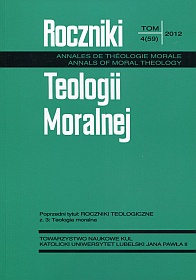Rodzina „szkoła cnót społecznych”
Abstrakt
Any integral conception of education – including family education – must acknowledge the need for social education, which is due to the fact that the human being can develop only as the social being. However, the readiness to enter social personal relations can be taken for granted as automatic. It requires continuous effort and formation. Social education should take into account the good of the community and the good of the educated person. This is why the concept of participation is of particular use in educating for social life. Participation does not only mean engaging in social relations, looking for external links with the world. Participation draws upon relations that stem from the internal structure of the personality. This is why participation constitutes something more than a kind of human action through which people cooperate. In this sense, participation is a human attribute, thanks to which a person acts with others to self-realize him/herself.
The role of the family in social education cannot be overestimated. Family life helps discover the depth of selfless love, teaches responsibility for others in the name of the common good. When the developmental environment of the family offers appropriate models, a young human can discover that he/she lives „through others”, and learns to live „for others.” In this way, the family becomes the „school of fuller humanity” and the „school of social virtues.” This is why the family should be looked at as the foundation of proper social relations and the most effective tool of humanization and personalization of the society.
Bibliografia
Cozzoli M.: Giustizia. W: NDTM s. 498-516.
Czaja A.: Wychowanie jako dzieło miłości. Perspektywa teologiczna. RNR 1(56):2009 s.87-100.
Derdziuk A.: Cnoty. W: JanPaweł II. Encyklopedia nauczania moralnego. Red. J.Nagórny, K. Jeżyna. Radom: POLWEN 2005 s.117-121.
Derdziuk A.: Cnoty społeczne. W: Leksykon obywatela. Red. S. Serafin, B. Szmulik. Warszawa: Wydawnictwo C. H. Beck 2008 s. 1.
Dobrzanowski E. S.: Cnoty społeczne. W: JanPaweł II. Encyklopedia nauczania społecznego. Red. A. Zwoliński. Radom: POLWEN 2003 s.68-76.
Gocko J.: Rozwój społeczny człowieka. W: Wzrastanie człowieka w godności, miłości imiłosierdziu. Red. M. Kalinowski. Lublin: Wydawnictwo KUL 2005 s.39-53.
Goffi T.: Solidarietà [I-II]. W: NDTM s. 1263-1265.
Greniuk F.: Katolicka teologia moralna w poszukiwaniu własnej tożsamości. Lublin: RW KUL 1993.
Kondziela J.: Osoba we wspólnocie. Z zagadnień etyki społecznej, gospodarczej imiędzynarodowej. Katowice: Księgarnia św. Jacka 1987.
Machinek M.: Renesans nauki o cnotach we współczesnej teologii moralnej? TiM 4:2009 t. 6 s.27-39.
Majka J.: Etyka społeczna i polityczna. Warszawa: Wydawnictwo ODiSS 1993.
Majka J.: Wychowanie chrześcijańskie – wychowaniem personalistycznym. W: Wychowanie personalistyczne. Red. F. Adamski. Kraków: Wydawnictwo WAM 2005 s. 155-168.
Merino C. E., Haro de R. G.: Teologia moralna fundamentalna. Tł. A. Liduchowska. Kraków: Wydawnictwo M 2004.
Pokrywka M.: Osoba – uczestnictwo – wspólnota. Refleksje nad nauczaniem społecznym Jana Pawła II. Lublin: RW KUL 2000.
Pokrywka M.: Antropologiczne podstawy moralności małżeństwa i rodziny. Lublin: Wydawnictwo KUL 20112.
Ratzinger J.: Wprowadzenie w chrześcijaństwo. Tł. Z. Włodkowa. Kraków: Wydawnictwo Znak 1994.
Skorowski H.: Wychowanie do postaw etycznych w społeczeństwie demokratycznym. „Seminare” 10:1994 s.119-135.
Wojtyła K.: Osoba i czyn. W: Tenże. Osoba i czyn oraz inne studia antropologiczne. Red. T. Styczeń i in. Lublin: TN KUL 1994 s. 43-344.

